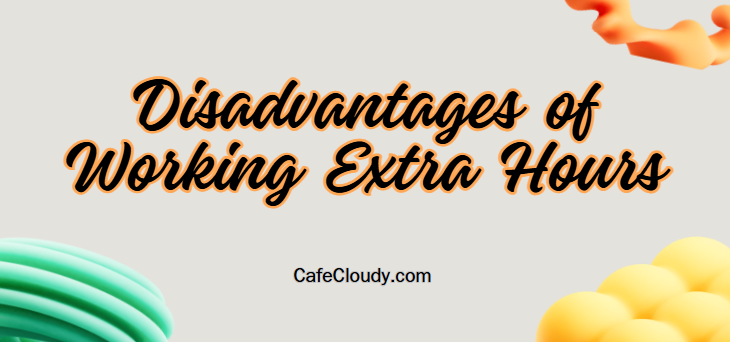
With time, the extended working hours, odd working schedules or working time became nearly a common scenario at most workplaces in all parts of the world. This is also another source of income, a part-time job, or a profession for some. The financial costs of working more than a normal working load are, however, hardly ever considered. Whereas such occasional additional hours can be forgiven, when they begin to turn into a regular phenomenon, the negative outcomes they have on health, productivity, relationships and overall satisfaction in life are manifold. Its disadvantages are also important to be aware of, in order that people, employers, and policymakers can arrive at more balanced conclusions of whether or not to work extra hours.
Some of the extreme disadvantages of working long hours include those related to the physical conditions. Research also finds that the extent of working hours above the range of about 55 to 60 hours every week is positively related to the augmented jeopardy of cardiovascular failure, cardiac disease and stroke. According to a progress report by the World Health Organisation (WHO) and the International Labour Organisation (ILO), there is a high risk of stroke and ischemic heart disease among those who work 55 or more hours per week compared to other citizens who work within their regular working hours. Being at work consumes a lot of time too, which translates to less sleep, which is a form of fatigue, thus impairing recovery and weakening the immune system.
Besides the physical impact, overtime can be quite damaging to mental condition. Stress, anxiety, depression, and burnout are likely to come as a result of excessive work. It is reported that research has uncovered that workers who do overtime are more likely to develop insomnia, chronic stress, poor psychological health or well-being. The mind needs relaxation as much as the body; therefore, in case the work hours grow, there is hardly time to rest, find activities and even a normal life of leisure. The accrued mental weight in the long term might be counterproductive to job satisfaction and lead to emotional burnout.
The second weakness is that productivity levels are more likely to decrease following the same trend of keeping more working hours in weeks or months. The most traditional line of reasoning would be that the longer the hours one works, the higher the level of production would be, but studies have turned out to disprove that. It reduces productivity per hour, which is triggered by fatigue and insomnia, and the likelihood of errors is increasing. Indicatively, employees contribute to lower quality work, errors, and are even required to repeat something once they have reached a certain work threshold of a set number of hours worked per week. This unwarranted might cancel out the advantage of the added time spent.
Regular overtime also affects the work-life balance in a disastrous manner. Overtime mitigates family, sleep, self-interest, and self-care time. This lack of balance may put personal relationships under strain and diminish work satisfaction and overall happiness. With time, continuous exhaustion with no rest between work shifts may induce chronic exhaustion during off intervals.
The issue of long-term well-being and risk behaviour is closely related to the concept of work-life balance. People with unhealthy lifestyles have several ways to handle the overwork, and they tend to become overworked and only want to eat fast food instead of cooking, avoid doctor visits, or increase the use of alcohol or stimulants. These behaviours predispose risks of obesity, diabetes, and other chronic disorders.
Safety hazards in some of the occupations are also present. Having had excessive hours in the workplace, individuals are more likely to make mistakes, accidents, or injuries. For example, in places of work that require some physical labour or operation of machinery and so on, fatigue can predispose people to accidents.
In conclusion, any amount of work over what can be identified as a healthy or sustainable workload poses numerous severe drawbacks. Physical health is also impaired by cardiovascular risk, poor sleep, fatigue, and morbidity. Stress, anxiety, and burnout also destroy mental health. Instead of improving productivity, continuous working hours tend to increase inefficiency, increase the number of mistakes, and deteriorate the quality of the work. Unhealthy behaviour and safety risks can destroy long-term well-being, relationships, and diminish life satisfaction through the erosion of work-life balance. Occasional overtime might be reasonable or unfortunate, but in the long run, useless or even counterproductive.

This post has been authored and published by one of our premium contributors, who are experts in their fields. They bring high-quality, well-researched content that adds significant value to our platform.


